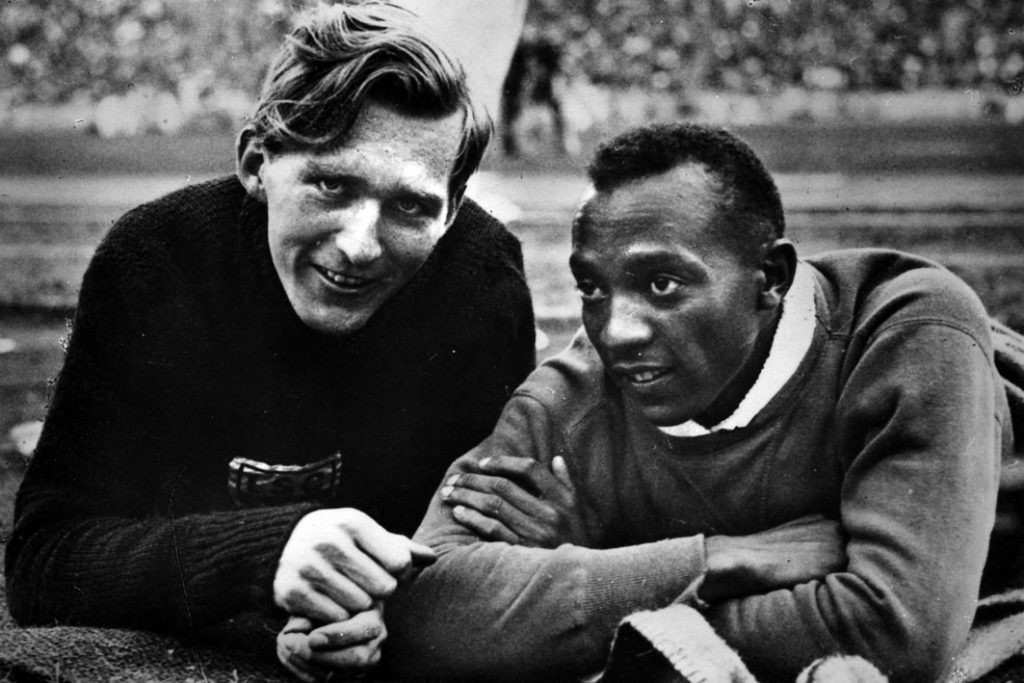
It’s known as the “greatest 45 minutes in sports history.”
In May 1935, at the annual Big Ten track meet at Ann Arbor, Michigan, an extraordinary athlete named Jesse Owens set three world records and tied a fourth in less than one hour.
Owens, who represented Ohio State University, tied the world record for the 100-yard dash, then established new global standards for the 220-yard dash, the long jump, and the 220-yard hurdles. No one in the history of sports has equaled such an effort. It didn’t take long for America to fall in love with Jesse Owens. Fans and patriots couldn’t wait to see what he would do at the 1936 Summer Olympics in Berlin, which was already being dubbed “Hitler’s Olympics.”
Owens was not intimidated by the idea of challenging the Fuhrer’s mythology of Aryan Supremacy.
That’s because, as an African American, he was already living in a culture that treated him as a second-class citizen.
Born into a poor sharecropper’s family as the youngest of 10 children, he was baptized James Cleveland Owens – or “J.C.” for short. An elementary school teacher didn’t hear that quite right and wrote down “Jesse” instead. The name stuck.
The Owens family moved to northeastern Ohio. His high school athletic record was so impressive that Ohio State invited him to become a Buckeye. But unlike the white members of the track and field team, he was denied a scholarship. Owens was forced to work multiple jobs to pay his tuition, had to live off campus with the other black athletes, and was refused the privilege of dining with his white teammates.
Undeterred, he excelled every time he jumped, sprinted, or hurdled, winning a place on the U.S. Olympic team.
A number of journalists publicly begged him not to go. Why should he support the Nazi propagandists? By going to Berlin, he would appear to be legitimizing Adolph Hitler. The same dilemma has confronted many of the athletes currently participating in the Winter Olympics at Beijing. Why should they help generate international headlines for a nation that so consistently ignores human rights?
But other journalists had a different take. American victories on the track in 1936 – especially by black athletes – could help change the global narrative.
Owens did not hesitate. He would go.
In the span of a few days, he established credentials as the greatest track and field star of all time – rivalled only, perhaps, by the remarkable Carl Lewis. Jesse took home four gold medals. He won the long jump, the 100 meters, 200 meters, and the 4×100 meters. Owens was added at the last minute to the 4×100 team when two of the American sprinters, both Jewish, were removed from the competition by American officials in an attempt to appease Hitler – a decision that would long be lamented.
The rise of Jesse Owens brought hope to African Americans. For the first time, an entire nation cheered for a black man. Sports could make a difference.
But the transformation of national attitudes was still decades away. As Owens reflected after his return to the United States, “Although I wasn’t invited to shake hands with Hitler, I wasn’t invited to the White House to shake hands with the president, either.”
One of the most remarkable stories connected with his experience at the Olympics happened out of the spotlight. Years later, Owens was still marveling at the generosity of one of his competitors. A German competitor.
The long jump was considered Jesse’s slam-dunk event. Over the course of his career, he had won every competition except one.
Shockingly, however, he misjudged his launching point on his first two qualification jumps. He fouled both times. Suddenly he was on the verge of elimination.
As he prepared for his third and final attempt, Jesse was approached by Luz Long, Germany’s national champion long jumper. “He came over and remeasured my steps,” Owens recalled, “remeasured my takeoff mark, and he laid out my sweatshirt right next to the takeoff board as a marker to help my jump.” Thanks to Luz’s suggestions, the American was able to qualify for the gold medal round.
Later that same day, Luz Long jumped 25 feet, 9 and 27/32 inches. It was a new Olympic record. But a few minutes later Owens jumped 26 feet, 5 and 5/16 inches. Now he had the Olympic record – not to mention the gold medal.
Owens later wrote, “Luz was second. But in my book of sportsmanship he ranks first.” He added, “It took a lot of courage for him to befriend me in front of Hitler… I would melt down all the medals and cups I have and they wouldn’t be a plating on the 24-karat friendship that I felt for Luz Long at that moment.”
Who knew that a representative of the nation America considered reprehensible would end up embodying the apostle Paul’s amazing counsel to put others first? “Do nothing out of selfish ambition or vain conceit. Rather, in humility value others above yourselves, not looking to your own interests but each of you to the interests of others” (Philippians 2:3-4).
That day in Berlin, Long and Owens became friends. They appear side-by-side in the photo above. The pair corresponded regularly for the next seven years.
Tragically, Luz died while fighting with the German army in Sicily in 1943.
In his last letter, Long wrote to Owens and asked him to contact his son Karl after the war (which Owens did). He urged him to talk about his father and “what times were like when we were not separated by war. I am saying—tell him how things can be between men on this earth.”
How can things be between men on this earth?
By God’s grace, we can learn to respect each other. Help each other. Look past the differences we see in each other.
And even cheer each other on to victory.
